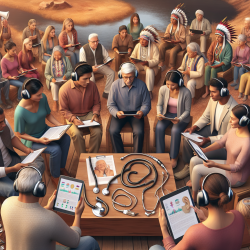In the ever-evolving field of special education, practitioners are constantly seeking ways to enhance their skills and better serve their communities. One invaluable resource is the research article titled "Hearing Screening in Isolated Native Communities" by Ronald Fahey, Ph.D. This comprehensive study provides key insights and methodologies that can significantly improve hearing screening programs in isolated communities.
Dr. Fahey's project had several primary goals, including providing hearing screening services to school-age children in the Habay-Assumption and Fort Chipewyan regions of Alberta, and offering hearing testing services to individuals referred by nursing staff. The study highlighted the necessity of such programs due to the high incidence of medical problems potentially related to hearing acuity and the lack of specific hearing-oriented medical aid programs in these areas.
For practitioners looking to implement or improve hearing screening programs, here are some key takeaways from the research:
- Preschedule Testing: Prior to the project, schedules for screening and pure-tone testing were established, and detailed procedural outlines were designed to standardize testing procedures and pass-fail criteria. Recording forms were developed, and audiometers were calibrated to ISO specifications.
- Community Engagement: Upon arrival at the respective centers, the program outline and timetable for testing were presented to school principals and teachers. Class registers were recorded on hearing screening forms, and separate testing rooms were obtained for each audiometrist. Arrangements were made for interpreters when necessary, and community hearing testing was advertised through posters, personal contacts, and letters sent by nurses.
- Comprehensive Screening Procedures: The study established a detailed order for testing, starting with playschool, kindergarten, and grades one through three, followed by second screenings and pure-tone testing for those who failed the initial screening. This process was repeated for higher grades and individuals referred by nursing staff.
- Follow-Up and Data Recording: Information was meticulously recorded on various forms, including classroom screening forms, individual screening forms, and pure-tone audiograms. Copies of these forms were distributed to teachers, nurses, and the Assistant Regional Director of Indian Health for follow-up.
The results of the study were telling. In Assumption, 89% of the 228 students were screened, with 44% failing the first screening and 13% being referred for medical examinations. In Fort Chipewyan, 94% of the students at Bishop Piche School were screened, with 19% failing the first screening and 10% being referred for medical evaluations. These statistics underscore the importance of comprehensive hearing screening programs in isolated communities.
For practitioners, implementing the methodologies outlined in this research can lead to significant improvements in hearing screening programs. By adopting standardized procedures, engaging with community stakeholders, and ensuring meticulous data recording and follow-up, practitioners can better serve their communities and address hearing-related medical issues more effectively.
To read the original research paper, please follow this link: Hearing Screening in Isolated Native Communities.










